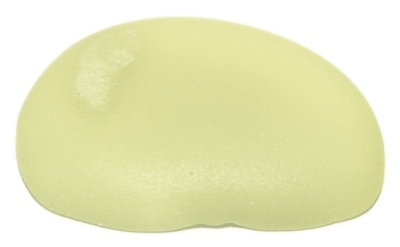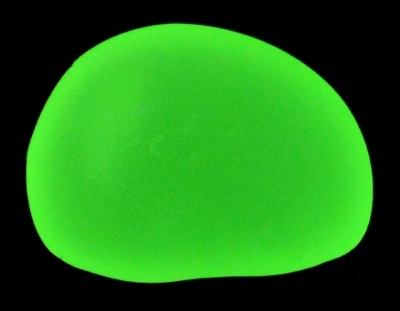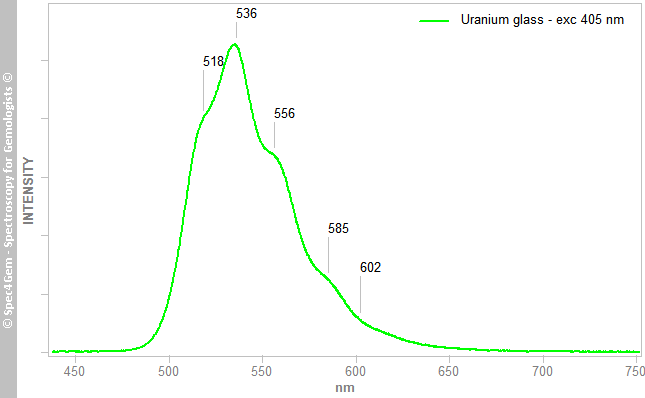Uranium glass
- Details
- Created: Sunday, 06 December 2015 18:58
Uranium glass is glass which has had uranium (U), usually in oxide diuranate form, added to a glass mix before melting for coloration. The proportion usually varies from trace levels to about 2% by weight uranium, although some 20th-century pieces were made with up to 25% uranium [1].
The sample being studied here (figure 1) was kindly donated by Pierre Leglise - Comptoir optique - Charleroi - Belgium.
Such a glass is known to be highly responsive to UV exposure with a green luminescence, bright green under long-wave UV (figure 2) and chalky green under short-wave UV.
 Figure 1. The uranium glass showing its pale yellow color in daylight
Figure 1. The uranium glass showing its pale yellow color in daylight| Shape | flat rounded |
| Size | 24.2 x 18.3 x 6.3 mm |
| Color | pale yellow |
| Lustre | vitreous |
| Transparency | translucent |
| Weight | 21.75 ct |
| SG | 2.56 |
| RI | - |
| DR | - |
| Pleochroism | not applicable |
| Polariscope / Conoscope | anomalous extinction (dark cross appear to writhe like snakes) |
| SWUV | chalky green |
| LWUV | bright green (see figure 2) |
| Magnetic suceptibility | inert |
| Radioactivity |  1.1 to 1.4 µSv/h (~240 to 300 cpm) 1.1 to 1.4 µSv/h (~240 to 300 cpm) |
Table 1. Observational and measured properties
 Figure 2. Exposed to a 365 nm source (long-wave UV), the glass 'glows' bright green.
Figure 2. Exposed to a 365 nm source (long-wave UV), the glass 'glows' bright green.Photoluminescence spectroscopy:
This uranium glass easily glows green even with low power led, no need of laser to get such amazing luminescence. The corresponding emission spectrum is available in figure 3 and shows the characteristic UO22+ emission.

Figure 3. The 405 nm excitation photoluminescence spectrum of the uranium glass shows the characteristic spectrum of UO22+.
Conclusion:
A piece of man-made glass glowing bright green under LWUV for which the luminescence cause is easily explained using photoluminescence spectroscopy. The material owes its bright green luminescence to UO22+. Note that the material is sligtly radioactiv with 1.1 to 1.4 µSv/h.

